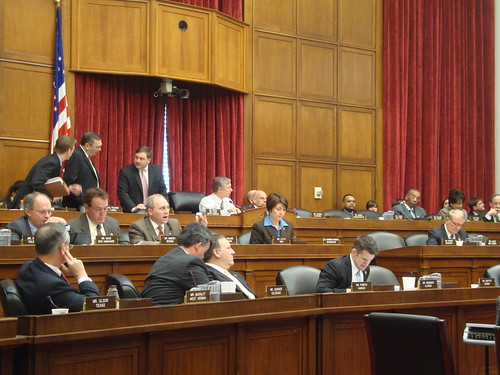Ben Kamisar / Medill
WASHINGTON — A House committee toughened a controversial bill that would authorize construction of the Keystone XL pipeline, recently rejected by the Obama administration.
The amendment, added Tuesday by Rep. Lee Terry, R-Neb., forces the Federal Energy Regulatory Commission to issue a permit for the pipeline within 30 days of the bill’s passage. If FERC fails to do so, the bill would require a permit to be issued automatically.
“By taking the issue out of the president’s hands and entrusting the issue of the pipeline with an agency, I hope we can depoliticize this issue and get the pipeline, the jobs and the energy that comes with this pipeline,” Terry said.
The Terry amendment also orders FERC to issue the permit without any additional conditions.
Democrats like Ranking Democrat Henry Waxman fear this clause is risky.
“This legislation is not about letting experts do their jobs,” said Rep. Waxman, D-Calif. “FERC testified before us that it was impossible to allow for public comment and still [come to] a decision in 30 days…We’re going to tell the experts at FERC to issue a permit but first we are going to put them in a straight jacket.”
Republicans generally support the pipeline, which would carry Canadian oil from Alberta through the heartland of the United States. They claim President Obama is caving to special interests on a project that they believe would bring as much as 100,000 “shovel-ready” jobs to America with few environmental consequences. Obama declined to approve the $7 billion project in November, in part due to concerns over its path through the sensitive Sand Hills region in Nebraska.
Opponents also argue that the jobs figure is exaggerated and that there has not been enough time to fully assess the project’s environmental impact.
The House Energy and Commerce Committee approved the pipeline measure 33-20. The GOP plan is to fold the measure into the much larger Energy and Infrastructure Jobs Act, set to be voted on by the House of Representatives later this month. This would mean Obama would either have to veto a major piece of legislation because of the pipeline provision, or sign it and allow construction to begin.
Much of Tuesday’s debate centered around an amendment by Rep Ed Markey, D- Mass., which was voted down by the panel after extended debate. He sought to bar all refined petroleum products created from the Keystone XL pipeline’s oil from being exported. Markey’s concern is that the project could allow the Canadian oil company TransCanada to take advantage of the U.S.
“Now we are letting Canada drill there, ship here and re-export there, all so that we in the United States will have to pay more in terms of money in the gas pump and costs to the environment,” Markey said. ”My amendment ensures that when the pipeline is legislated on, the oil and any fuels made using it will stay here to benefit Americans. Here, we will pay less.”
However, Republicans attacked the Markey amendment, arguing that the language was too restrictive and could be interpreted as limiting the exportation of all products made with Keystone oil, from toothbrushes to pantyhose.
“If you read this amendment by the congressman from Massachusetts, you can really call this the Ship More Jobs to China Amendment because under this amendment, no American company would be able to manufacture products…using oil byproducts,” said Rep. Steve Scalise, R-La. ”There are a lot of products that help save lives…aspirin uses petroleum, it is one of the byproducts of manufacturing aspirin.”
Other Democratic lawmakers also tried to alter the bill with amendments.
Illinois Rep. Bobby Rush proposed an amendment restricting use of eminent domain, and Rep. Mike Doyle, D-Penn. called for at least 75 percent of the iron and steel used to construct Keystone to come from domestic sources. Addressing public safety concerns triggered by the pipeline, Rep. Anno Eshoo (Cal.) introduced an amendment pushing for more restrictions on hazardous liquids.
All were shot down by the Republican majority.
“There are members on this side of the aisle that agree with you on supporting the pipeline, but they do have reservations about how it’s being done,” said Eshoo. “I’m not going to stop it because you are all hell bent on getting this thing done no matter what. I’m just saying slow down a little and know whether these pipes are safe enough to carry something that can be highly detrimental.”


